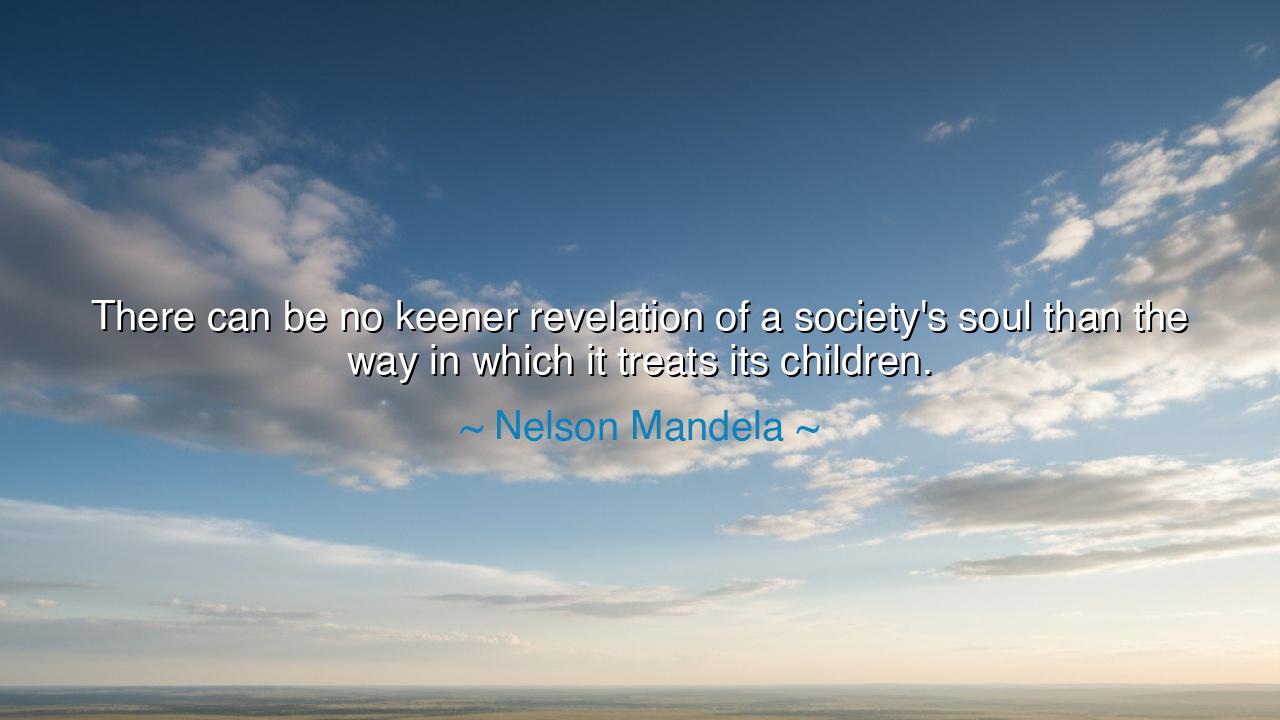
There can be no keener revelation of a society's soul than the
There can be no keener revelation of a society's soul than the way in which it treats its children.






Hear, O seeker of wisdom, the timeless words of Nelson Mandela: “There can be no keener revelation of a society’s soul than the way in which it treats its children. These words, born from the lips of a man who bore chains for the sake of freedom, pierce to the very heart of human civilization. For children are the most vulnerable among us, the inheritors of our deeds, the living mirrors of our values. To see how a people regard their children is to see their true spirit, stripped of masks, uncloaked of pretense.
A child cannot protect himself, cannot feed herself, cannot carve out a future without guidance. Thus, the responsibility falls upon the society that surrounds them. If the young are nourished with love, education, and dignity, the soul of that society is radiant. If they are neglected, abandoned, or exploited, then the soul of that nation is corrupt, no matter how gilded its palaces or how mighty its armies. Mandela, who witnessed the children of South Africa suffer under apartheid, knew that the true measure of justice is not how it treats the powerful, but how it guards its smallest and weakest.
Consider the tragedy of the Industrial Revolution in Europe. Great machines roared, and wealth poured into the hands of a few, yet countless children labored in factories and mines. They worked through nights, their small bodies twisted by toil, their futures stolen by greed. In those dark hours, society’s soul was revealed—not in its inventions, but in its cruelty toward the young. Progress without compassion was no progress at all; it was corruption wearing the mask of advancement.
Look also to the story of South Africa itself. During apartheid, children were torn from schools of promise and thrust into systems designed to break their spirit. They marched in Soweto in 1976, holding nothing but books and songs, and were met with bullets. These children, suffering the lash of injustice, revealed the sickness of the system. Yet in their courage, they also revealed the seed of change. For a society that harms its children cannot endure, and from their suffering arose a movement that toppled oppression itself.
Yet, O listener, there are also stories of hope. When nations choose to honor their children, they rise with a strength that cannot be measured in wealth. After the Second World War, Japan, in its ruins, turned its eyes to education. It invested in schools, in the training of minds, in the care of the young. From ashes, it built anew, not merely through industry, but through its children. This choice revealed the rebirth of its soul, and the generations that followed carried the nation into renewal.
The lesson, then, is eternal: do not judge a society by the shine of its monuments, nor by the might of its armies, nor by the wealth of its merchants. Judge it by its treatment of children. Are they fed? Are they safe? Are they taught to dream? If so, the soul of that nation is alive. If not, it is hollow, no matter what mask it wears before the world.
So I say to you, O child of tomorrow: care for the young wherever you find them. Protect them not only with words but with deeds. Build schools instead of prisons, feed mouths instead of coffers, give books instead of chains. For in each child lies the soul of humanity’s future. And remember Mandela’s wisdom: the truest revelation of who we are is found not in how we treat the strong, but in how we guard the small.






AAdministratorAdministrator
Welcome, honored guests. Please leave a comment, we will respond soon